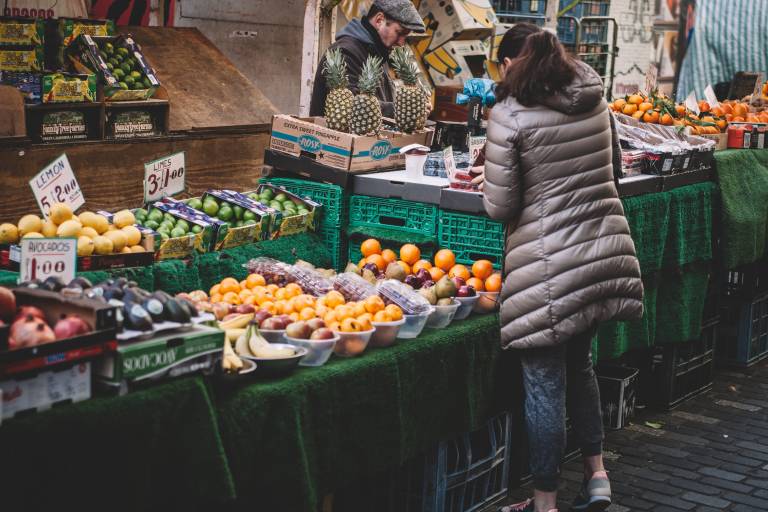Taking care of yourself and each other as the cost of living rises
13 October 2022
Many students are concerned about how the rising cost of living will affect their wellbeing. UCL Student Funding Manager Liz Eden provides some suggestions for staying healthy for less.

Many students are concerned about how the rising cost of living will affect their wellbeing, so here is how to make sure you are looking after your physical and mental health.
With the start of the new academic year, many students might be worried about how the rising cost of living will impact their finances while they study. During this time, it’s very important to make sure you are not putting your health at risk. Here are our suggestions for staying healthy for less.
Eating well
There are lots of resources online to help students cook tasty and nutritious meals for less covering a range of dietary requirements.
If you live with other people, cooking communal meals can be a fun way to spend time together and also save you money on your grocery shopping. Chat with your housemates to see how you can use kitchen space most efficiently as batching cooking and freezing meals can save a lot of money.
Think about where you shop. There can be a big cost difference between retailers on staple items like rice, pasta, tinned and canned foods, as well as fresh produce. It might be cheaper to stock up on baked beans at one shop but get fruit and vegetables elsewhere. Remember, convenience items like ready meals are usually much more expensive.
Staying warm
As the weather gets colder through the autumn and winter months it’s really important to make sure you stay warm. One common tip is to focus on keeping yourself warm rather than heating the whole space around you. However, be careful, because allowing your home to get too cold can risk other problems such as damp, which in turn can be seriously harmful to your health.
There are lots of other suggestions online for ways to reduce your utility bills. If you’re worried about an upcoming utility bill, get in touch with your service provider as soon as possible to make them aware you are struggling. Citizens Advice has some guidance for how to do this.
Personal health
All students should ensure they are registered with a GP. This is free to do under the NHS for all students, as international students pay a healthcare surcharge as part of their visa.
If you do fall ill, follow NHS advice. For non-urgent healthcare concerns, you can use the free NHS 111 service. If you need to buy non-prescription medications, you can save a lot of money purchasing non-branded versions of products such as paracetamol, aspirin, ibuprofen, sore throat lozenges, plasters, and antiseptics instead of the branded equivalents. Always follow the directions for taking medicine and if you have any questions you can speak to a pharmacist free of charge. In a medical emergency always call 999. It’s also very important you follow UCL’s advice about staying home to avoid infections spreading.
Make sure you are looking after your sexual health. There are lots of places where you can pick up condoms for free, including the Student Union building on Gordon Street. The NHS has a list of places where you can get free contraception, and access other sexual health services too.
Free sanitary products are available at lots of bathrooms across UCL. It may also be worth looking at reusable period products such as washable period knickers and silicon cups. These cost more up front, but they can save you a lot of money in the long run compared to single use tampons and towels, and they are better for the environment too.
Socialising for less
Meeting new people and making new friends is a big part of student life, and it’s important for your mental health as well. Socialising doesn’t have to be expensive. London has a huge number of parks, museums & galleries which are free for people to enjoy. Some money saving tips can also be great ways to spend time with other people. Try learning a new skill like sewing with a group of friends so you can mend rather than replace fabric items. Clothes swapping parties are also a fun way to socialise and get a new wardrobe without spending anything.
Remember money can be a very sensitive topic for some people. Lots of people don’t want their friends knowing about their financial struggles, and don’t like to feel they are taking charity from people they know. So be mindful of how you spend time outside of the classroom and consider suggesting activities which don’t cost anything. A weekly coffee at an expensive café after a lecture might not be a big deal for you, but it could cause a classmate a lot of stress.
Support from UCL
There’s lots more money saving advice on our funding webpages, including advice about bank accounts and making a budget. Our Student Funding Advisors can help students with complex funding queries. If you think you are at risk of running out of money, don't wait until you're choosing between skipping a meal or turning on the heating to ask for help. The Financial Assistance Fund is now open to help students who facing financial hardship and students who are affected by the rising cost of living can access support and guidance at UCL’s Cost of Living Hub.
For more wellbeing advice on a range of topics visit our Student Support and Wellbeing pages. If you want some independent advice, our Student Union colleagues can support students with a range of issues.
Liz Eden, UCL Student Funding Manager
 Close
Close

